Game of Thrones: And Now His Watch Is Ended
Welcome to a Dorkadia review of Game of Thrones! Reuben is writing these from the perspective of a book reader & show watcher, but focusing on the show and using the books to inform his perspective; there will be discussion of previous book moments but no spoilers for future events. Expect this to be a weekly feature, albeit one starting just a teensy bit late.
There’s a subtle, priceless moment in this week’s Game of Thrones, fleeting enough to pass over without much notice. Margaery Tyrell manages to distract her husband-to-be Joffrey from his tour of Targaryen corpses (everyone needs a hobby, and Joffrey’s is cataloging historical dead people) long enough to wave to the teeming crowds of King’s Landing, which terrifies his mother. After all, the last time Joffrey went out in public, there were riots and peasants flinging actual shit and the Hound killed about seventeen people. This time, though, due to the proximity of Westeros’s own Princess Diana, the crowd cheers Joffrey, and he basks in their adulation. Cersei Lannister’s reaction is a conflicted welter of emotions – a little pride and satisfaction, a little fear, a lot of jealousy, and the dawning realization that despite her paranoia, she’s still underestimated the Tyrells and their influence.
It’s a fabulously acted moment, but it’s also sort of a keystone for the loose theme of “And Now His Watch Is Ended” – sudden and shocking shifts in power. Power, of course, is sort of the main point of Thrones, spelled out explicitly in Varys’s* season 2 monologue lifted straight from A Song of Ice & Fire; what makes this episode interesting is in how many different ways the rug is pulled out from under previously secure characters. Whether through trickery, overconfidence, unfamiliarity, or good old-fashioned direction application of violence, “Ended” is mostly an hour-long reminder that nobody in Westeros or Essos is really secure in a position of power. Ever.
(*Random note: lots of Varys tonight, and that pleases me. Conleth Hill is one of this show’s best supporting players and it was nice to see Varys, for once, supremely off balance and scrambling to keep up.)
Take Jeor Mormont, erstwhile Lord Commander of the Night’s Watch and unfortunate casualty referenced in the title. There’s not a great deal of exploration, on screen or page, of exactly what qualifies a man to lead everyone’s favorite band of robbers, rapists, and noble idiots; leadership is decided by a vote and held by the shreds of discipline and honor remaining on the Wall. Those shreds just ran out, and a weary and defeated Mormont, concerned with keeping the generally revolting Craster happy and peaceable, failed to do the same for his own men. He obviously possessed some force of personality and tactical wisdom, but the Old Bear was just that – an old man, far from home, surrounded by the young, hungry, and desperate. Given the unexpected disaster the Night’s Watch encountered, it’s hard to see what more he could have done, but the situation did argue for suspending some inconvenient rules and forcing Craster (again, literally one of the worst people in the world) to offer the Watch his more enthusiastic support. But then, a Mormont capable of doing that sort of thing might not have been a Mormont capable of rising as high as he did. He’ll be missed.
Speaking of Mormonts capable of breaking the rules, his son Jorah didn’t have much to do this episode, but he makes a convenient transition to the episode’s other major moment of violence. Compared to the sudden and fairly unexpected brutality of the Night’s Watch revolt, Daenerys’s unique business transaction with Astapor’s slave-masters – well, non-readers had to see something like that coming. After a whole season of “Where the fuck are my dragons?!” there was no way she was trading a child for any amount of soldiers, with or without functional genitalia; the only question was exactly how she would take what was hers. As it turned out – who’da guessed? – it was fire and blood. While nobody’s going to mourn the slimy Kraznys, there’s much more to the scenario than Daenerys Stormborn, Foe of Slavery; she’s invaded a sovereign state, stripped them of their local army, murdered many of their civic leaders, and left the local citizenry effectively defenseless. Whatever their culpability in a slaving society, one hopes that the show explores the ramifications of this, if not the implications.* I’m pleased to say that the books examine that later on, and hope the show takes the time to do the same.; until it does, we have an incredibly emotionally satisfying scene to keep us warm. “Dracarys.” Never not awesome.
(*Dorkadia fave Saladin Ahmed brought up an excellent point, and while I don’t believe that’s the show’s intent, it sure as hell deserves thinking about.)
On the subject of book-to-show transitions, Daenerys’s material this season has been a good primer in the limitations and possibilities of the adaptation. Take the early-season introduction of Barristan Selmy, seen this week standing around looking gruff. In ASOIAF, Barristan is re-introduced as, essentially, a Random Old Dude, squire to another character who tragically didn’t survive the adaptation. (RIP Strong Belwas, mourn you till I join you); it isn’t until the end of the third book that his identity is revealed to Dany & the reader. Obviously you couldn’t keep his identity from the viewers, no matter how luxurious a beard Ian McElhinney can grow, so the choice was made for Barristan to reveal himself immediately, instead of introducing him to Dany by his code name of “Arstan Whitebeard” and winking at the audience for a season and a half.
But while that neat little twist is lost in translation, new possibilities are opened. In the books, it’s clear from the get-go that Dany understands the Valyrian spoken by Kraznys and his fellow slavers, and much of her inner monologue is the horror and frustration that she can’t allow to crack her facade of non-understanding. Her use of the tongue in the culmination of her negotiations was a nice touch, but just kind of an inevitability that took second fiddle to the explosion of dragonfire. By contrast, the TV medium allowed Dany to appear ignorant to viewers right up until she fluently commands her new army and excoriates Smugly the Slaver. Her direct comments to Kraznys might have been over-the-top, but Daenerys Targaryen is not about subtlety; pretending not to understand Valyrian is about as underhanded as she gets. As a conqueror and a would-be monarch, descended from one military culture and adopted by another, Dany is all about the wham lines and the big explosions, and the translation conventions of television allowed the producers of “Ended” to add one of the former to support the latter, with great effect.
Of course, you can’t do everything with adaptation. Theon’s material this season is written entirely fresh for the show, and if you want to talk about having the rug pulled out from under you…ouch. It’s tough to invest viewers in a deliberate shaggy dog story, but there’s value there in the mystery of Theon’s savior/tormentor and his own far-too-late realizations, carried as always by Alfie Allen’s excellent acting. After a solid season of making Theon the most hilariously awful fuck-up in a continent full of them, it’ll be interesting to see if they can transition him back to any kind of sympathy. If Theon’s experiences with the Anonymous Psychopath With the Bow are anything like those alluded to off-page in the books, it’ll be hard not to feel sorry for Theon, assuming you can bear to stay in the room and watch.
Also in the universe of “kind of totally fucked” is Jaime Lannister, confronting for the first time in his life what it means to be truly powerless. There’s some viable reasons to feel empathy for the Kingslayer (that unfortunate title and how he earned it being one), but “suffering” is not one of them; Jaime has always been privileged even by the standards of Westerosi noblemen, his life a ping-pong between easy triumphs and first world problems. Even defeated and taken captive by his enemies, he got the chance to screw with their heads and achieve a certain kind of victory; after all, Jaime Lannister is all about winning. Now, as his new friend Brienne mercilessly informs him, he’s seeing how the other 99% lives. I don’t know how much thinking about the fleeting nature of power & authority he’ll have the chance to do, though – Tyrion’s the philosopher in the family, and also there’s his own rotting hand tied around his neck. It’s going to take more than a pissed-off pep-talk from a fellow captive to get Jaime back on the horse.
(Great cut, by the way, at the end of this scene – Brienne asks Jaime why he lied to save her from Locke’s soldiers, and the answer is a shot of Cersei. There’s a few ways to interpret that.)
There was a lot of other good setup in the episode that deserves mention – Tywin Lannister, as always, stole the show with his brief screen-time, because Thrones is Charles Dance’s house and everyone else just gets to hang out there. It’s great to watch Lena Headey (who, to double down on what I said above, quietly killed it tonight) get a chance to work with him, and her movements against the Tyrells offer the possibility of some impact in the thus-far sluggish King’s Landing material. Of course, the city is livened up by the continually delightful presence of Olenna Tyrell, who, in case you missed it, is Old and Does Not Give A Fuck. I hope the character doesn’t become overexposed, as is a worry with TV darkhorses. (Note that they’ve toned down on Bronn a bit this season, which is good.) And if all else fails, there’s the continually crushed dreams of Sansa Stark. She was very happy in this episode. That can’t bode well.
Finally, attention must be paid to the introduction of Beric Dondarrion, grizzled, one-eyed leader of the Brotherhood Without Banners. I have to say, something about this scene fell a little flat with me. Maybe it was the somewhat cliched nature of his speechifying before the Hound, which didn’t have nearly the rhythm of the equivalent introduction from the books (probably necessary for time reasons); maybe it was simply the fact that some things will never be as cool as my imagination made them nine years ago. But I also think this scene was a slight casualty in the “grittifying” of GoT. Things just aren’t as outsized and colorful as they are in the books – the heraldry is muted, the castles are smaller, and the personalities are a bit more subdued and realistic, HBO before they’re fantasy. It’s necessary, and I’d argue that it improves some characters (see: Varys, Jorah Mormont, Shae), but you lose some things, and one of them is the sense that when Lord Beric steps onto the page in A Storm of Swords, you’re seeing one of Westeros’s last actual heroes.
Damn, now I need to reread that scene. In any case, despite the lack of derring-do and wondrousness inherent in the hollow hill, there’s still a great piece of setup there as Sandor Clegane, who is just about all out of shits to give about anything, gets a better adaptation of his biting speech against the ideals of the Brotherhood and we get to see where the power really lies: the Hound says one thing, Arya says another, and so someone has to fight and someone has to die. It always seems to come down to that in Westeros; when Tywin tells Cersei “You’re not as smart as you think you are,” he’s saying something that should be stamped on the morning planners of every would-be kingmaker, profiteer, and mercenary adventurer on the show. After a slow first couple episodes, last week’s “Walk of Punishment” hit the ground running, and “Ended” didn’t slow it down any. Good times ahead.

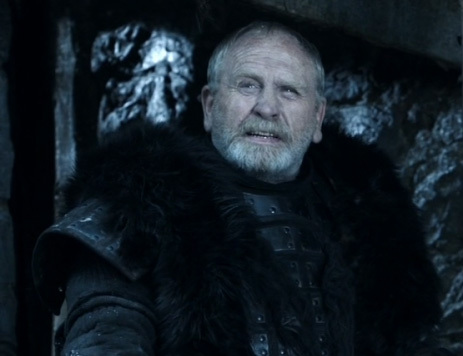
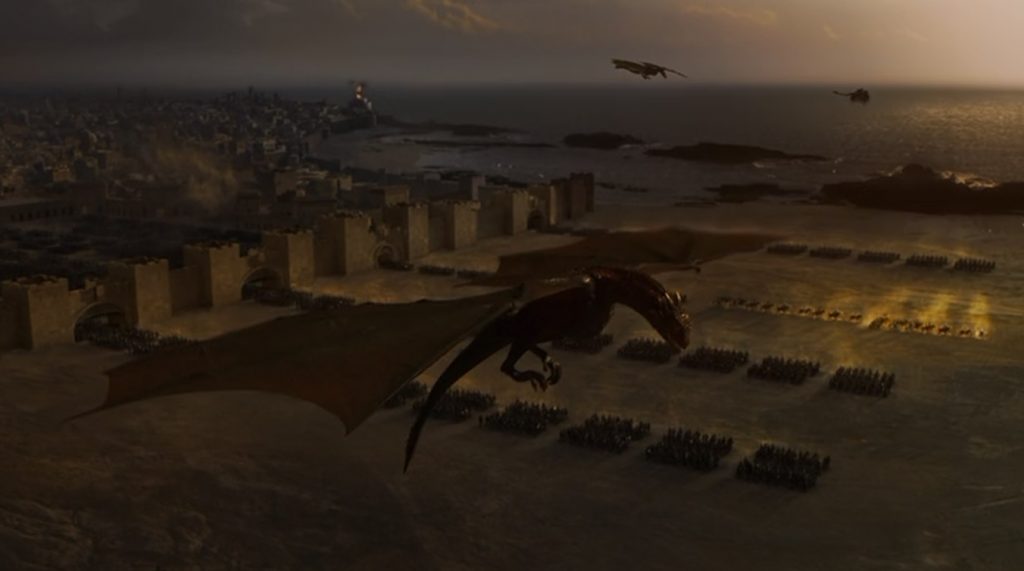
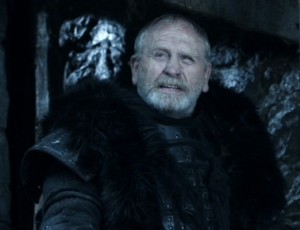
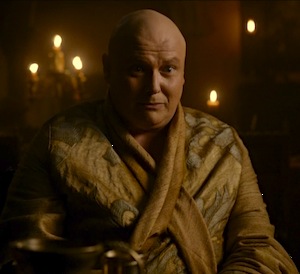
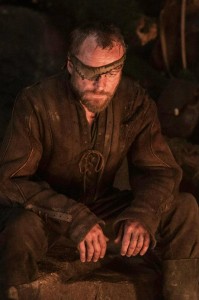


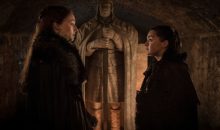
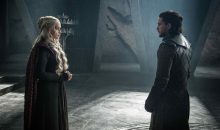
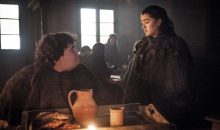
Belwas nooooooooooo
Now that I’m current on the show and not just the books, I feel I should also point out how subtly they are knocking Cersei’s character development out of the park. If memory serves, this is about the time in the books we start seeing chapters devoted to her perspective. Usually, for me this would be about the moment where I start to empathize with the character in question, but her narratives and internal monologuing were so damned heavy-handed at times that I was either enjoying a good bit of schadenfreude or just waiting for them to be over.
Not in the show, though. They’ve managed to condense pages upon pages of her jealousy and growing paranoia concerning the New Queen into a couple of catty exchanges and a few meaningful looks. The scene in the Great Sept is particularly demonstrative – her moment of understanding with Olenna in the midst of watching her son connecting with his bride-to-be broadcasts growing unease without a single line of dialogue to that end. Well, at least not directly.
“I’m being replaced. Is this what awaits me?”